Of all the domesticated animals on earth, none is more abundant or important as the chicken. Originally raised for cockfighting or ceremonies, chickens are now primarily raised for food. In fact, as of a few years ago, people now consume more chicken than any other domesticated animal. More than 23 billion chickens are raised in captivity, primarily on factory farms. This makes the chicken the most common bird species in the world. You can find chickens on every continent except Antarctica. While most people raise chickens for meat or eggs, some also keep them as pets. In addition, you can find feral chickens living in certain areas. These populations are usually the ancestors of domestic chickens that have returned to the wild. Given their abundance, it takes a significant amount of food to keep all those chickens fed. That said, this begs the question, “what do chickens eat?”
In this article, we’ll attempt to put this question to rest. We’ll start by exploring what chickens eat, and list off some of their favorite or commonly eaten foods. Then, we’ll delve into how chickens forage and consume food. Next, we’ll take the time to contrast the diets of wild versus domesticated chickens. Finally, we’ll end with a discussion concerning what baby chickens eat. So get ready, because you’re about to get the answer to the question “what do chickens eat?”
What Do Chickens Like to Eat?
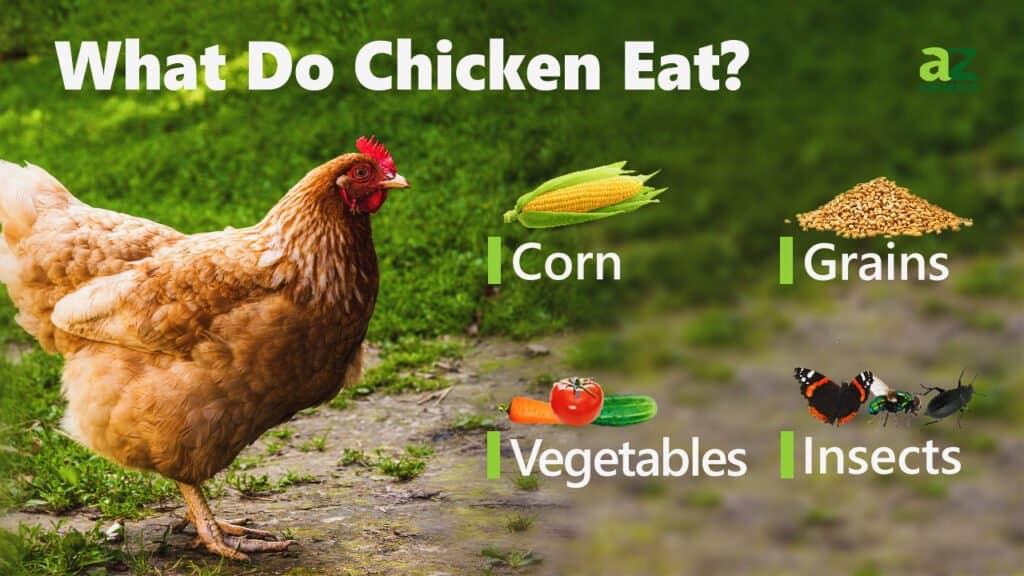
Chickens are omnivores, meaning that they eat both plant and animal matter. By and large, chickens will eat just about anything that they can fit into their beaks. That said, they can occasionally be picky eaters. Although their taste buds aren’t as developed as some animals, chickens still prefer certain foods. Usually, if a chicken isn’t eating a certain food, it’s because it knows there’s something better nearby. In the wild, chickens forage for their food, so must rely on what’s locally and seasonally available. Meanwhile, domestic chickens don’t have to worry about this problem, and instead live off of chicken feed and whatever else they can find in their yard or pen. That being said, we’ve identified a number of foods that chickens frequently feed on and enjoy. Here are 12 foods that chickens like to eat:
- Grasses
- Weeds
- Worms
- Insects
- Grains
- Vegetables
- Fruit
- Eggshells
- Seeds
- Small mammals
- Reptiles
- Amphibians
How Do Chickens Find and Consume Food?
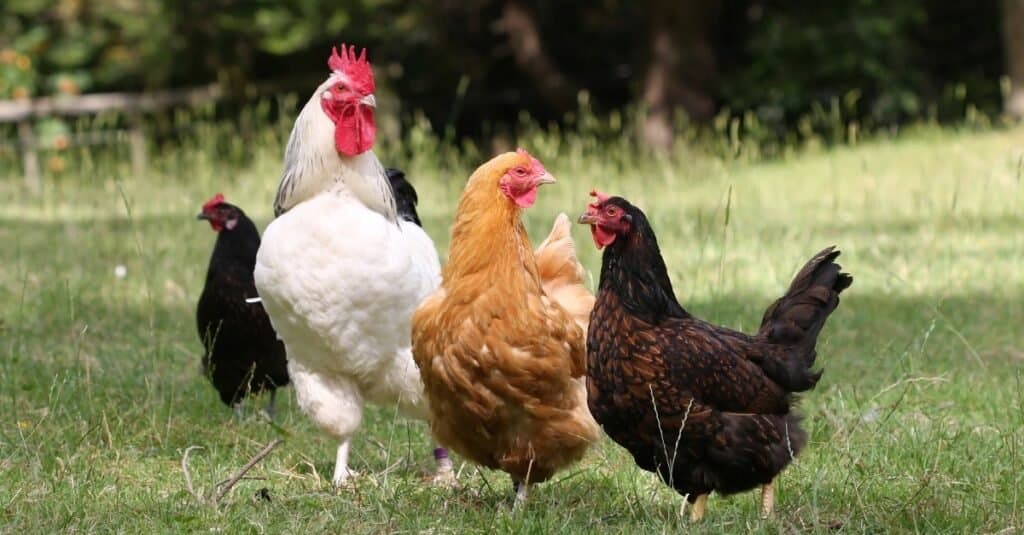
Chickens possess excellent eyesight and hearing.
©iStock.com/fotoshoota
Most people think of chickens as rather dull animals. In reality, this assessment couldn’t be further from the truth. Chickens are actually quite intelligent and are capable of recalling the trajectory of hidden objects and anticipating future events. As such, they rely on their heightened senses to help them locate food. First, chickens possess incredible eyesight. They can see in 310 degrees and can move their eyes independently of one another. They use their keen eyes to locate and track food. Behind eyesight, chickens also rely heavily on their hearing, but hearing is mostly used for communication and to avoid predators. Due to their small, hard tongues, chickens don’t rely much on taste. The same goes for smell, and while chickens apparently find certain odors repellent, they don’t use smell much while foraging. Finally, chickens are also sensitive to touch, particularly their beaks, which they use to investigate and manipulate food.
Chickens are predominantly foragers, meaning they spend most of their time grazing for grasses, weeds, and seeds. While foraging, chickens will use their beaks to peck at or beat food against the ground. With this method, they can break up their food into smaller pieces. That said, chickens are also predators and frequently hunt for smaller animals. Common prey that chickens feed on includes small mammals, reptiles, amphibians, insects, bugs, and worms. When hunting for prey, chickens will chase down their prey and pin it with their claws or beak. At top speed, chickens can run up to 9 miles per hour. They are also quite agile, which makes them very capable of hunting down even swift prey. Upon catching their prey, they may pick or break it apart before swallowing any pieces whole.
What Do Chickens Eat in the Wild?
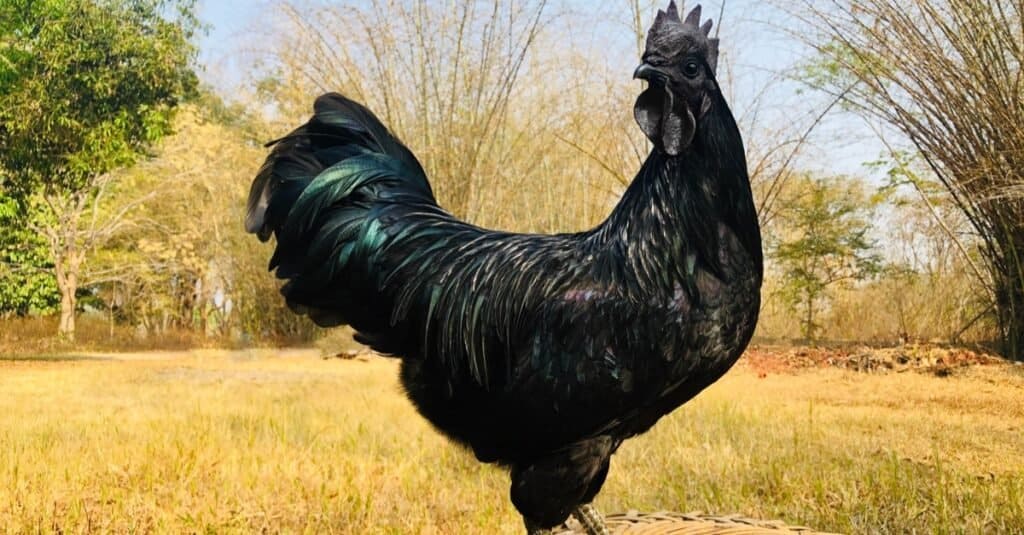
Wild chickens mostly forage on grasses, weeds, and insects.
©Bass001/Shutterstock.com
While most chickens live on farms or as domestic pets, there are some chickens that live in the wild. Known as jungle fowl or feral chickens, these birds must rely on their senses and predatory instincts to survive. Depending on the environment, wild chickens may eat a wide variety of different foods. Foods will also vary depending on the season, with grasses, weeds, and plants becoming more scarce in winter. Generally speaking, chickens enjoy grasses such as buckwheat, clover, bluegrass, and dandelions. They will also eat insects and bugs such as grasshoppers, termites, ticks, beetles, centipedes, spiders, and scorpions. Chickens will gladly guzzle down worms or caterpillars, as well as insect larvae. In addition, they will catch and eat small animals such as rats, mice, lizards, snakes, and frogs. On occasion, they will also eat the eggs of other animals, and may even scavenge on carrion, including other chickens.
What Do Domesticated Chickens Eat?
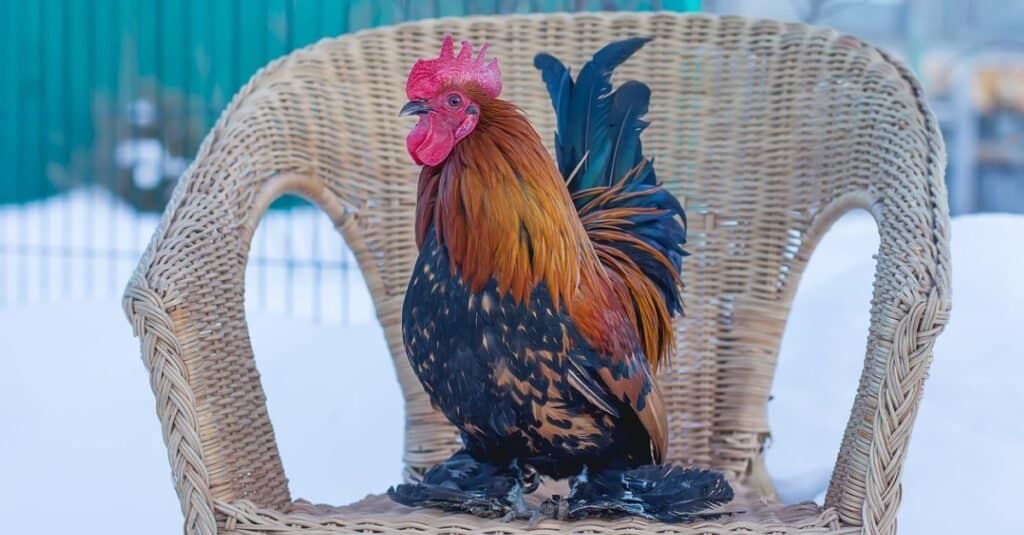
Domesticated chickens primarily subsist on chicken feed, which contains grains like soybean and canola.
©iStock.com/Andrey Babeshkin
Domesticated chickens eat different foods depending on why they are being raised. For example, chickens raised for meat eat differently than chickens raised for egg production. Additionally, pet chickens may eat completely different diets, as they may be allowed more snacks and variety. That said, by and large, most domesticated chickens eat specially formulated chicken feed. Chicken feed is mostly made of grains and includes things like soybeans and canola. Overall, chickens raised for meat are fed chicken feed that’s higher in protein. Meanwhile, egg-laying hens will require more calcium in their diet. Outside of feed, pasture-raised or free-roaming hens will also forage for insects, seeds, grasses, and weeds. We’ve also compiled a list of foods that you can feed to your chickens. Here are some safe foods for chickens:
- Meat scraps (excluding chicken)
- Cooked vegetables
- Cooked rice and pasta
- Eggshells or oyster shells
- Dairy (milk, cheese, or yogurt)
- Fruit
- Fish and fish skins (no bones)
- Greens
- Bread and crackers
It’s important to remember that there are certain foods you should avoid feeding your pet chickens. These foods are either toxic, can get lodged in a chicken’s throat, or can spread disease. The list of foods you should not feed domesticated chickens include:
- Chocolate
- Coffee
- Moldy food
- Salt
- Soda
- Processed foods
- Chicken scraps
- Avocado
What Do Baby Chickens Eat?
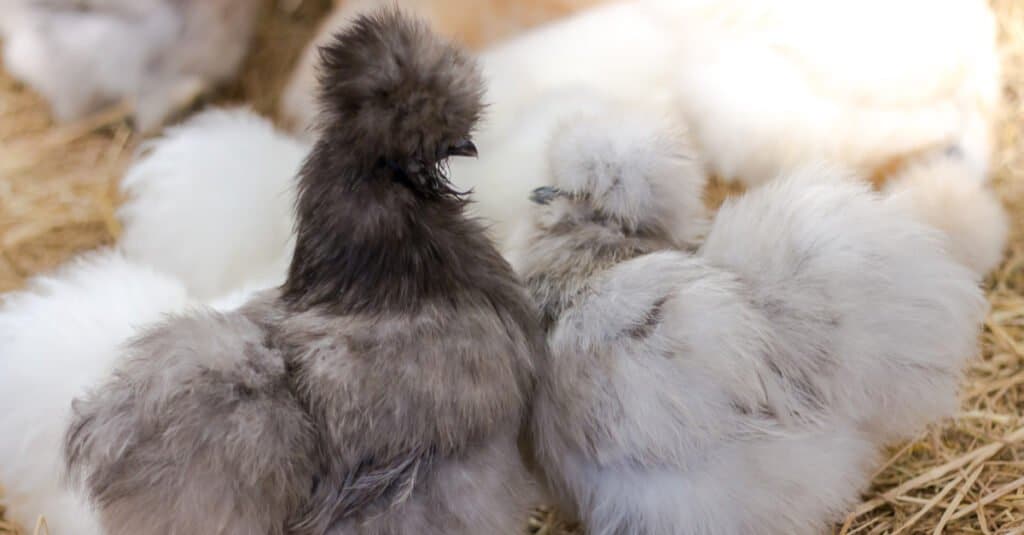
Baby chicks eat pretty much the same things as adult chickens.
©9wittgiggs/Shutterstock.com
Baby chickens, or chicks, are extremely well developed after hatching. At just one day old, they can move around, eat, and drink on their own. That said, most chicks will stay close to their mother for the first 6 weeks of life. During that time, attentive mother hens will help to feed the chicks by holding food in their mouths for the chicks to peck at, or dropping food on the ground for the chicks. By and large, baby chicks will eat the same foods as adult chickens. They will forage for seeds, grasses, and weeds, and also hunt for insects and worms. Chicks enjoy foods such as fruit, leafy greens, and grasses. Remember to avoid feeding baby chicks the same foods that you wouldn’t feed to an adult chicken. And before introducing new foods to your baby chicks, check with a veterinarian or local chicken feed expert.
The photo featured at the top of this post is © iStock.com/500
Thank you for reading! Have some feedback for us? Contact the AZ Animals editorial team.







